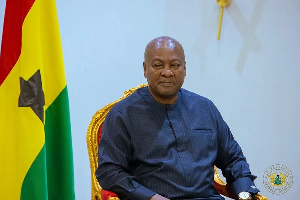 President of Ghana, John Dramani Mahama
President of Ghana, John Dramani Mahama
In the realm of leadership, certain qualities transcend mere competence, elevating individuals to the status of visionary figures capable of inspiring and transforming societies.
And beneath the surface of policy and strategy lie the essential qualities that define a true leader: forthrightness, creativity, and, crucially, honesty. These traits, when woven together, form the foundation of a culture that embraces progress and tackles challenges head-on.
The late former President J.J. Rawlings, a figure renowned for his own direct and often unconventional approach, understood the power of honesty. His views, sometimes controversial, were never shrouded in ambiguity. He spoke his mind, even when it challenged the status quo, earning him both admirers and detractors. It is through this lens that his comments on President John Mahama gain particular significance.
Rawlings, in his characteristic style, once declared that "John Mahama is a president for the future." He went on to suggest that Mahama's "nature and style" would make him a fitting leader in advanced nations like Switzerland. This praise wasn’t merely flattery; it highlighted specific attributes that Rawlings believed were crucial for effective governance.
Central to Rawlings' endorsement was Mahama's "forthrightness and sense of discipline." These are not simply desirable qualities; they are cornerstones of effective leadership. Forthrightness, the quality of being direct and honest, builds trust and allows for open communication. It encourages transparency and discourages the backroom deals and hidden agendas that can undermine progress.
Discipline, on the other hand, is the engine that drives progress. It ensures that promises are kept, plans are executed, and resources are managed efficiently. Without discipline, even the most ambitious visions remain just that – visions, unfulfilled and unrealised.
Rawlings lamented that instead of celebrating and learning from these qualities in Mahama, some were "steeped in petty political-mindedness" and unable to recognise a potential role model. This criticism resonates deeply. Often, the focus shifts to partisan squabbles and short-term gains, blinding us to the long-term benefits of honest and decisive leadership.
The initial months of a leader's tenure are often the most critical. They set the tone for the administration and provide a glimpse into the leader's commitment to fulfilling their promises.
According to commentaries from the people of Ghana, President Mahama’s early actions, including appointments, fulfilment of promises and tackling the economy within two months of taking office, are heartwarming. This suggests a proactive approach, a willingness to take swift action to address pressing issues, and a dedication to delivering on campaign pledges.
The value of forthright leadership extends far beyond political pronouncements and policy decisions. It permeates every level of an organisation, fostering a culture of accountability, innovation, and collaboration. When leaders are honest, they empower their teams to speak openly, challenge assumptions, and contribute their best ideas.
While policy debates and political strategies are important aspects of governance, the enduring value of forthright leadership cannot be overstated.
It is the bedrock upon which trust is built, progress is achieved, and nations thrive. As we reflect on the leadership qualities championed by figures like JJ Rawlings, let us remember the importance of celebrating and fostering truthfulness, creativity, and, above all, the courage to speak our minds and act with conviction. This is the path to building a better future, not just for ourselves, but for generations to come.